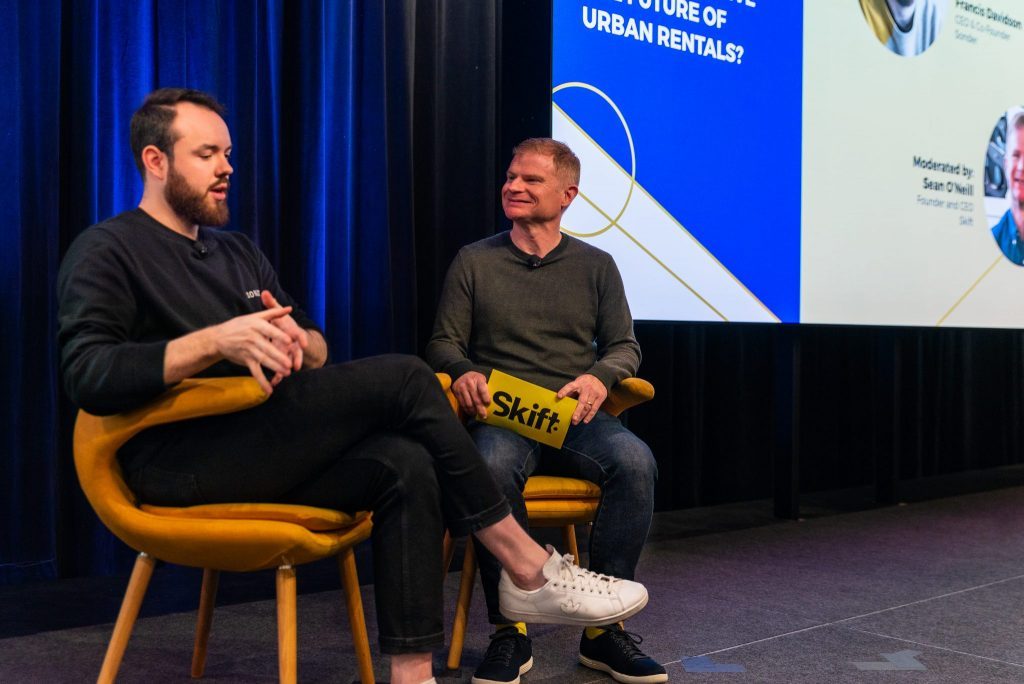Skift Take
CEO Francis Davidson is clearly very, very ambitious — and has identified a path for Sonder to go on and challenge the very biggest names in hospitality.
 Hospitality company Sonder has ambitions to become the next-generation Hilton or Marriott as part of its plan to radically redefine the industry.
Hospitality company Sonder has ambitions to become the next-generation Hilton or Marriott as part of its plan to radically redefine the industry.
The San Francisco-headquartered firm has raised a total of $360 million in funding and has been putting the money to use growing in cities across the world.
Speaking at Skift Short-Term Rental Summit, Sonder co-founder and CEO Francis Davidson said it was important to learn from the big hotel companies but then rework how to do things better and more efficiently.
“We think there could be a globally recognized brand that operates hotels and apartments and villas and any accommodation category. And so I think what we’re trying to achieve, our aim is to be the next-generation Marriott or Hilton and not simply be a trend or a short-term rental operator but rather to rethink the entire hospitality business from a consumer perspective but thinking through how tech can reshape its operations,” Davidson said.
Sonder is already encroaching onto the territory of the big brands. It actually already has around 26 hotels with another 70 currently under negotiation.
“We are a hotel operator in addition to being a STR (short-term rental) operator,” Davidson said.
Davidson co-founded Sonder back in 2012 along with Lucas Pellan. The business didn’t really get going until a couple of years later following a slightly disastrous visit to San Francisco. The company recently raised an additional $225 million in Series D funding.
Sonder describes itself as a “tech-enabled hospitality company” and operates as a serviced apartment crossed with a hotel. The idea is to lease a space, kit it out, and then run it as efficiently as possible to squeeze out a profit. Around 60 percent of the time, Sonder takes over the entire building.
Technology is a key differentiator for the business especially compared to some of the more established industry names who have outsourced the function.
Davidson said this was the “Achilles’ heal” of the hotel sector.
“If you start looking at the cost structure of operating a hotel: Deconstruct a hotel, and you’ll see that a really large fraction of those expenses could vanish if you were to build technology into it,” he said.
Davidson said Sonder had used technology to cut down the time and cost it took to kit out a new room.
“That allows us to spend a minimal amount of capital to set up a new property, that’s one of the reasons we’ve been able to grow so rapidly and have so many properties,” he said.
Sonder is currently in 26 cities across six countries, with 10,000 units signed.
Part of the challenge with the Sonder model is factoring in an economic downturn, so you’re not stuck with high rent and falling room prices if things go bad. Sonder said it has built some protection into its leases to cope with a change in circumstance.
Asked abut learning lessons from the WeWork debacle, Davidson said there were a number of “red flags,” adding that it was a gentle reminder that profitability “is extremely important.”
Dwell Newsletter
Get breaking news, analysis and data from the week’s most important stories about short-term rentals, vacation rentals, housing, and real estate.
Have a confidential tip for Skift? Get in touch
Tags: skift short-term rental summit, sonder, str2019
Photo credit: Sonder CEO Francis Davidson (left) speaks on stage at Skift Short-Term Rental Summit in New York City on December 5, 2019. Skift
